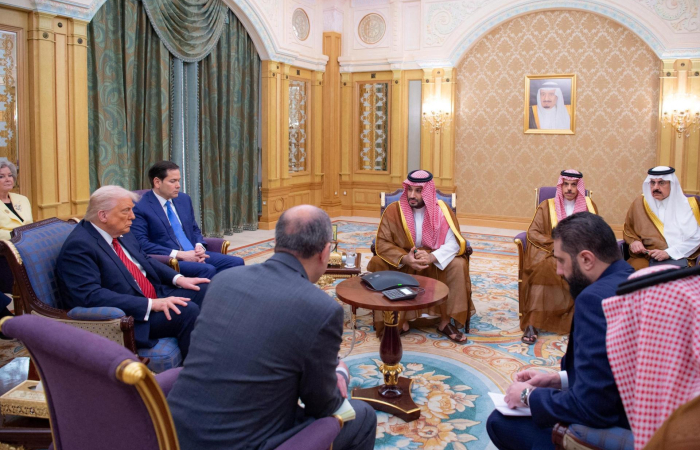US President Donald Trump met with Syria's president Ahmed al-Sharaa in Saudi Arabia on Wednesday and urged him to normalise ties with longtime enemy Israel, after an announcement that US would lift all sanctions on the Islamist-led government. Trump met the Syrian president before a summit between the United States and Gulf Arab countries. They shook hands in the presence of Saudi Arabia's Crown Prince Mohammed bin Salman.
Turkish President Tayyip Erdogan joined Trump and the Saudi Crown Prince virtually in the meeting. Trump urged al-Sharaa to join the United Arab Emirates, Bahrain and Morocco, which normalised relations with Israel under the US-brokered Abraham Accords in 2020, the White House press secretary posted on X.
The United States also hopes Saudi Arabia will join the Abraham Accords. Discussions on the issue came to a halt after the Gaza war erupted, and the kingdom insists there can be no normalisation without Palestinian statehood. Trump said on Tuesday that Saudi Arabia would join the accords in its own time.
Despite concerns within sectors of his administration over Syria's leaders' former ties to Al Qaeda, Trump said on Tuesday during a speech in Riyadh that he would lift sanctions on Syria in a major policy shift. He also said Washington was exploring normalising relations with Syria's government, beginning with his meeting with Sharaa.
The lifting of sanctions came despite deep Israeli suspicion of Sharaa's administration, worries initially shared by some US officials. Israeli officials have continued to describe al-Sharaa as a jihadist, though he severed ties with al Qaeda in 2016. The decision is a major boost for al-Sharaa, who has been struggling to bring the country under the control of the Damascus government after toppling former President Bashar al-Assad in December.
Removing US sanctions that cut Syria off from the global financial system will clear the way for greater engagement by humanitarian organisations working in Syria, easing foreign investment and trade as the country rebuilds.
Israel has opposed sanctions relief for Syria and has escalated its military operations since Assad was toppled, saying it will not tolerate an Islamist presence in southern Syria. Israel has seized ground in the southwest of the country, warned the Syrian government against deploying forces there, and blown up much of the Syrian military's heavy weapons and equipment in the days after Assad fell.
The challenges facing Syria's new government were also laid bare in March when Assad loyalists attacked government forces, prompting revenge attacks in which Islamist gunmen killed hundreds of civilians from the Alawite minority, drawing strong US condemnation.
The Syrian president was for years the leader of al Qaeda's official wing in the Syrian conflict. He first joined the group in Iraq, where he spent five years in a US prison. The United States removed a $10 million bounty on Sharaa's head in December.






